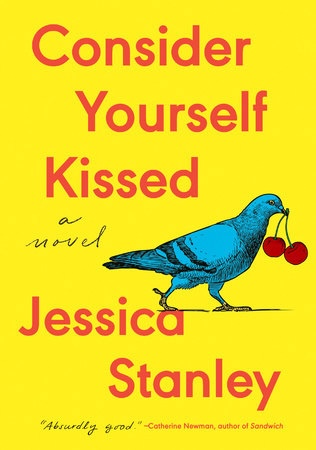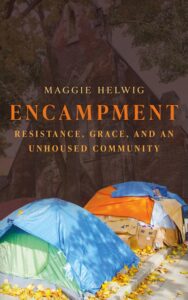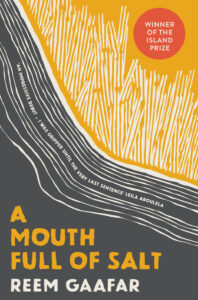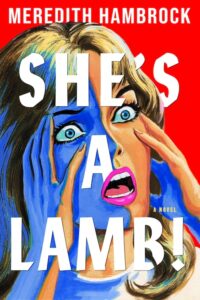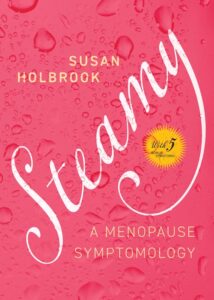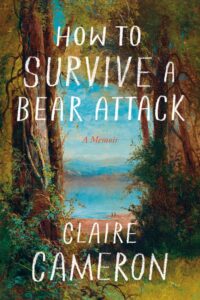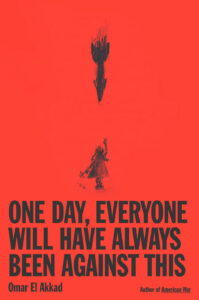June 3, 2025
Consider Yourself Kissed, by Jessica Stanley
I periodically wonder if, had I’d lived through any other period from my thirties into my mid-forties, I might look less ravaged by time right now. If I might resemble that woman I was in photographs until around 2013, whose hair was dark brown, her skin unlined, decidedly youthful. And while I have absolutely no complaints about my grey hair and wrinkles (I like how I look and I’ve known too many women who would have given anything to win their grey hair and wrinkles, but didn’t get the chance), I do wonder if the last decade and a bit has been just a bit EXTRA in terms of things that might age one seemingly overnight.
And this is the period that Jessica Stanley documents in her novel Consider Yourself Kissed, the story of a marriage set right close to the eye of the storm—Coralie is a Australian expat who falls in love with divorced dad and political journalist Adam after she rescues his small daughter when she falls into a London pond, and dropped into his world Coralie finds herself BELONGING for perhaps the first time in her life, after a peripatetic childhood, ensconced in a life that is rich and full. But maybe too full? Is there such a thing?
Against a tumultuous decade in British politics (during which Adam’s star only rises), including Brexit and the nightmare of five different Tory Prime Ministers, capped off with a worldwide pandemic, we see Coralie trying to balance the demands of motherhood and marriage with her own career, and failing enough that she feels pretty bad about all of it, all the while neglecting the creative dreams she stuffed in a drawer when she met her husband who had ambition enough for both of them.
Consider Yourself Kissed (the title comes from how a character in Mary McCarthy’s THE GROUP signs letters to his girlfriend, a literary nod to perfunctory love) reminds me of Nora Ephron’s Heartburn, which is pretty much the highest praise a critic can offer to a comic novel bridging the political and domestic. It’s a that book that shows how women ARE that bridge, making the lives of seemingly important men possible, mapping out quotidian details while their husbands are charting epic tales and being celebrated, while these wives stay quiet in the background. Except that Coralie reaches a point where she just can’t do it anymore, which is the moment we find her at when the novel begins, and to explain how she got there, she has to go back to the beginning…
Charming, funny, touching, and so engaging it’s almost exhausting (because WHAT A TIME IT’S BEEN), Consider Yourself Kissed is a complicated love story, and absolutely a delight.
May 23, 2025
The Names, by Florence Knapp
I was swept away by Florence Knapp’s novel THE NAMES a book that came on my radar when UK. bookseller Katie Clapham made it her book club pick. I was besotted by the premise: a mother in 1980s’ England walks to the registry office after a giant storm to register the birth of her son, a child is who intended carry the name of his father and his father’s father before him. But the child’s father is a monster, and so the mother makes a last minute switch and gives her baby a name chosen by his older sister. Or else she makes a different switch, and names the child herself. Or else she goes along with the original plan, naming the baby for her abusive husband as she’s expected to do, and the narrative rolls out in three different threads with what transpires with these different choices. The choices not just about the name the boy will carry—we encounter him and his family at seven year intervals throughout the next four decades—but the novel is so much more richly textured than that, being also about everything else that happens around him, especially his father’s responses to the different things the mother has done in choosing the names that she has and the different narratives that are put into motion, oftentimes unstoppable. (This book is tough to read in places. Imagine how many times the average novel might break your heart, and then multiply it by three. OOF.)
The NAMES recalled Kate Atkinson’s LIFE AFTER LIFE, another novel about fate and chance, and flaps of butterfly wings, and about how it’s impossible to ever get life completely right no matter how many opportunities you have to try. This is true especially in the novel’s depiction of domestic violence—there is not a single choice the mother will make that will ever be the right one. But in a more general sense, life is like that for everyone, every good outcome occurring with something else that’s lost, or other unseen consequences. To be in the world at all is only wild and capricious, risky, amazing, and awesome at once.
May 20, 2025
The Snag, by Tessa McWatt
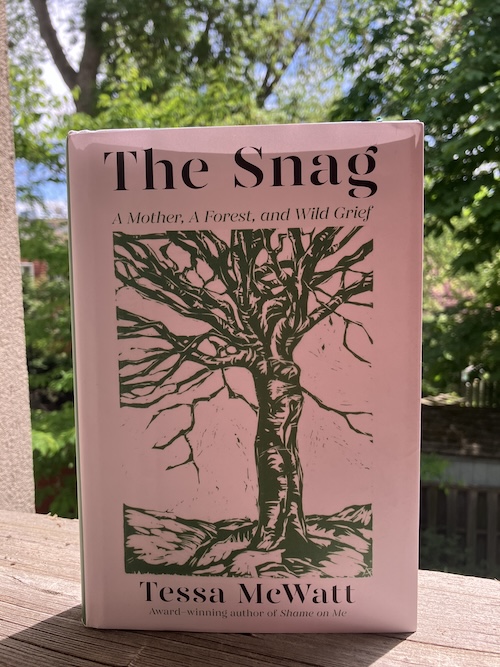
The Snag: A Mother, A Forest, and Wild Grief, by Tessa McWatt, the Guyanese-Canadian writer who lives in England, is a memoir woven of climate grief, the experience of slowly losing an aging parent, and one’s own experience of being in the world. How do we live? And how do we die? Which, of course, is mostly the very same question, and McWatt finds that the answer might lie in forests, and trees. In particular in the trees called “snags,” which are dead trees found in the forest and vital sites for biodiversity, a habitat for all kinds of creatures, and new life and possibilities. McWatt sees an analogy between snags and her own mother, whose dementia is worsening. The book begins on the day that her mother is moving out of her own home, one more uprooting in a life that’s been full of them. It is also, McWatt notes, “the last day of the hottest year in recorded history,” and she recounts a series of the catastrophes wrought by climate change over that year, plus an autumn that so much war and devastation.
“Grief arrives out of rupture. It is evidence of something treasures, now lost. If I sit with this evidence something else will surely come, the way a seed might eventually grow a tree. We are small and hungry and alive.”
Here is the thing that I love about this book, McWatt’s acknowledgement that grief must be sat with, but that also that this sitting is not the end of it. That something can come after this, and it will, but what? And once again, the answer is in the forests and the trees.
The Snag is one of the wisest books I’ve ever read, a memoir about observing, and listening, about music and singing, about the wonders of forests and what we can learn from them about connection and how to care for each other.
“Another world is possible. The extractive, consumptive way we are living demonstrates a severe lack of imagination. But we have the tools, models we use to reclaim, renew, invent. There are communities around the world still rooted, still defending their ecosystems, that are potent sites of resistance. And there are new ones being born.”
May 16, 2025
Encampment, by Maggie Helwig
Maggie Helwig—Toronto poet and novelist, human rights activist, and also Anglican priest at St. Stephen-in-the-Fields in Kensington Market, just a few minutes walk from my house—isn’t preaching to the choir when I pick up her new book, Encampment: Resistance, Grace, and an Unhoused Community. It’s not politically fashionable in the circles in which I travel, but my feelings about homeless encampments have often been complicated and less than generous over the last five years. I know how I’m *supposed* to feel—the “I Support My Neighbours in Tents” signs that others installed on their front lawns signal that direction, but I have a hard time conjuring that support, sustaining it. It works in theory, I guess, but then I show up at the park with my kids and the people living in the tents along its perimeter start screaming at each other and it’s disturbing and frightening. And I have a hard time too with being told that my discomfort doesn’t matter, that my complicated feelings are morally dubious, and that the politics behind any of this are simple, that this is simply a case of rich homeowners versus everybody else, as encampments grow and those of us without our own backyards lose access to public parks and green spaces.
And what I appreciated about Encampment is that there was grace for that, for my complicated feelings and frustrations, just as there is grace for the people screaming in the park, and the people who’ve made their home in the encampment in the St. Stephen’s churchyard over the last few years, and so many others. Maggie Helwig’s capacity for grace is absolutely awe-inspiring, and I read Encampment wishing desperately that the world would give the woman a break. Her own challenges and struggles are woven into the text as well, which underlines just how much she needs a break, but also how her refusal to compartmentalize human experience—that of herself and of others—is where her compassion comes from. Humans are messy and hard. Community is messy and hard. Systems are broken, and what else can we do but try to love one another the best we can?
There is a woman in this book who might be me. (I suspect that, no matter who you are, you will see yourself in many of the people in this book.) That woman is a neighbour who stops Mother Maggie one chaotic day in the parking lot. She’s frustrated by some of the encampment residents, she is afraid of violence, but mostly she is angry because she never wanted to be somebody who turned against vulnerable people. And Helwig writes, “Because it is terrible, and it shouldn’t be like this, and coming up hard against the truth that we live in a society that will dump people like garbage on the side of the road, and there is no good thing we can do, is an awful moment for anyone who hasn’t been through it yet.”
Those of us who live in a world where people are well and housed and healthy and stable have no inkling of what life is like for those beyond those limits, and Encampment rectifies that, explaining away the myths of homelessness, dismissing easy solutions—couldn’t they just…? If only…? The most powerful part of the book for me was when Helwig writes about stuff, possessions: “Maybe this is a good time to talk about the relationship that people have with things, and how far it is really just an inflection of our whole society’s relationship with things.”
And it’s this refusal to see any difference between neighbours, regardless of their housing, that makes Helwig’s voice and vision so extraordinary, and what makes Encampment such a necessary, clarifying, and life-changing read for so many of us right now. Some of the most frightening characters in the book are people with six figure incomes and roofs over their heads, not the guy unconscious in the doorway. Helwig writes, “The true, terrible threat is that, if you just one let these people get too close, you might learn that, underneath it all, we actually are the same. Poor bare forked animals in King Lear’s storm, in a world that’s always ending.”
May 7, 2025
A Mouth Full of Salt, by Reem Gaafar
Reem Gaafar’s debut novel, A Mouth Full of Salt, 2023 winner of the Island Prize for a debut novel from Africa (and the first book by a Sudanese writer to be recognized by the prize) grips the reader from its opening line, “Until a body was actually found, they referred to him as ‘missing.'” The body in question is that of a young boy presumed drowned in the Nile, a too frequent incident among the people from his village: “The Nile was a trap that attracted, ensnared, and buried all at once. It took from them as much as it gave.” Which what happened to Fatima’s brother after all, years earlier, a tragedy from which her mother has never recovered, leaving her a little outside the local community of woman, and this Fatima can relate to. She too is also set apart from her peers, although this is by her determination to pursue her education, as opposed to her good friend Sawsan, whose wedding is approaching.
A Mouth Full of Salt moves between Fatima’s perspective and that of Sulafa, the mother of the missing boy, whose been relegated in her household after her failure to have more children, and whose husband’s second wife is currently pregnant with twins. As the villagers keep watch for the boy’s body to resurface, other catastrophes beset the village one-by-one: farm animals are struck by an illness, and die on mass; fires take down gardens and orchards. Villagers are talking about prophecies, worry about a curse, and soon that something has gone very wrong for these people are altogether undeniable.
Like Sudan itself, this novel is cut in two, and in its second half, readers begin to understand how the nation’s history is at the root of what’s happening in the village. From the 1990s, we’re taken back to 1943 and to Nyamakeem, from the country’s south, who has fallen in love with Hassan, a northerner, an Arab. Such unions are rare and frowned upon, and Hassan is rejected by his family. The two of them attempt to build a life together in Khartoum all the same, raising their son, but when Hassan eventually stops coming home to them, Nyamakeem has no choice but to go back to his home village and his family to find out what happened.
How the lives of the women in this novel intersect is the crux of a taut and measured story. Gaafar, who now lives in Ontario, and is also a physician, has crafted a beautiful and compelling novel about women attempting to break free from the limits of their power.
May 5, 2025
The Cost of a Hostage, by Iona Whishaw
For the last few years, I’ve looked forward to a new Lane Winslow mystery novel in the spring like I’ve looked worked to forsythia blooms and cherry blossoms, and just like spring herself, author Iona Whishaw has never failed me. The Cost of a Hostage is the twelfth instalment in her series about the brilliant polyglot whose wits are only matched by her beauty and whose desire for a quiet life in the small community of Kings Cove, outside Nelson, BC, is thwarted by her tendency to stumble upon dead bodies and wander into crimes in progress. Thankfully, however, nobody is better equipped to solve these crimes, much to the chagrin of local Police Inspector Frederick Darling, who eventually becomes Lane’s husband. Which means he often finds himself in fixes like the one that kicks of this latest novel: Darling’s brother has gone missing in Mexico, and has perhaps been kidnapped; is there any possibility that Darling can get to Mexico without convincing his dear wife that she’ll be just fine staying at home? The answer is, of course, no, and so off they go, which Darling is not exactly sorry for. Lane Winslow is surprisingly useful to have around, and besides he likes her company. Their marriage is a rare and beautiful thing in the late 1940s, an arrangement of equality, both partners ardent in their admiration and respect for each other’s keen intelligence (though Darling would admit that Lane’s is the keener one).
Anyway, staying home might not have been so quiet either, after all. When a small boy is kidnapped in Nelson, the circumstances are curious, and Ames and Terrell, running the Nelson Police Department in their boss’s absence, have their hands full solving the crime, especially once their chief suspects turns up dead in the local ferry’s paddle-wheel.
Once again, Whishaw brings her readers a story with fascinating moral complexity and a healthy dose of feminism and progressive values. And yes, just enough peril that you’ll be totally gripped.
April 16, 2025
She’s a Lamb!, by Meredith Hambrock
Jessamyn St. Germain is bound for greatness, and her confidence is unshakable. Even though the discerning reader will swiftly note the gap between her self-perception and how the world receives her in Meredith Hambrock’s second novel, SHE’S A LAMB! (the title taken from a lyric in THE SOUND OF MUSIC’S “How Do You Solve a Problem Like Maria,” “She’s a darling! She’s a demon! She’s a lamb!”).
Instead of receiving a role in a regional production of the famous Rodgers & Hammerstein musical, Jessamyn is offered the job of childminder for the show’s youngest actors, an offer she suffers with indignation until it occurs to her that it’s an opportunity in disguise, that surely the director has little faith in the actress playing Maria and needs to keep Jessamyn nearby so she can step into the role when the time arises and finally have her moment in the spotlight.
SHE’S A LAMB! has been compared to the novel MY YEAR OF REST AND RELAXATION for its portrayal of a heroine so stuck up on in her own head that she’s disconnected from the world around her, although I liked Hambrock’s novel so much more for its character’s fierce and ferocious need and desire. There is no such thing as rest or relaxation for Jessamyn, whose singular pursuit of her goals leads her down dangerous paths and is going to end up with a body count.
On one level, SHE’S A LAMB! is a very dark comedy of the absurd in which Jessamyn is willing to do anything to make her dream come true—and get rid of anyone in her path in the meantime. With remarkable restraint, Hambrock leans away any possibility of redemption and focuses her narrative just as narrowly as Jessamyn herself has on her own possibilities. The result is hilarious, ridiculous, creepy and chilling at once.
And chilling most of all for the parts of it that seem most familiar. While Jessamyn never doubts herself, she knows that everybody else around her wonders about their own talent, their own potential, their own destiny. ‘”You don’t know,'” she tells the actress playing Maria, the role she covets, undermining her confidence. ‘”You wish. You hope. But you don’t know. You can’t know. You can never know.”‘
It’s a terrifying message that will ring true for anyone who ever wanted to be anything.
April 7, 2025
Steamy: A Menopause Symptomology, by Susan Holbrook
My first child was born in 2009, which was the year that Susan Holbook published her collection JOY IS SO EXHAUSTING, a book bursting with life and bodily fluids. I felt so seen by her epic poem “Nursery,” twelve pages documenting breastfeeding from side to side: “Left: Now that you’ve started solids, applesauce in your eyebrows, I’ve become a course. Right: Spider on the plastic space mobile, walking the perimeter of the yellow crescent moon. Left: Dollop. Right: Now it’s on Saturn’s rings; if it fell off, it would drop right into my mouth. Left: I take 2%, you take hindmilk. Right: Fingers shrimp their way through the afghan holes. Left: I have hindmilk.”
And now that I am 46, constantly itchy and getting my period every nineteen days, signalling the beginning of my perimenopausal journey, Holbrook has delivered STEAMY: A MENOPAUSE SYMTOMOLOGY, a poetic memoir that’s hilarious and searing at once. The baby from “Nursery” is all grown up now (see Symptom 29, “Dry Eyes,” in which the grown child is dropped off at university, and the poet does not cry. “For most of my life you could count on me to descend into blubbery convulsions at a filmic dog death or an airport farewell or, of course, a real dog death. I would readily cry for sad or happy reasons any old time. Now you can rarely squeeze a sob out of me. Maybe I’ve used up all my tears along with my eggs.”) and the poet is contending with other changes (see Symptom 3, “Cessation of Menses”: “I’m not sure why I never went to the doctor./ Maybe because I was so relieved each time my tsunami ended that I didn’t want to think about it again until three weeks later when I ruined the *other* side of the couch cushion”).
Like the symptoms of menopause themselves, Holbrook’s symptoms can go off on a tangent and sometimes end up being about raccoons or the time she broke her arm at age 11, which I don’t mind in the slightest because, like menopause, this book is full of twists and surprises, and, unlike menopause, it’s also very funny and rich with meaning (see Symptom 33, “Reduced Libido” for former, which is mostly about her grandpa, and Symptom 30, “Panic Disorder,” for the latter, “A year later my heart dances with the daffodils. I found a drug that muffles my panic but not my joy.”).
April 3, 2025
How to Survive a Bear Attack, by Claire Cameron
I never read Claire Cameron’s 2014 novel The Bear. My kids were 5 and 1 when the book came out, and at the time (and even now) I felt far too tender to contend with a story in which parents are killed in a bear attack and their small children are left to fend for themselves in the wilderness. Not unrelated to the arrival of my children OR my aversion to reading the story was also an anxiety that had settled into my consciousness like a fug and years later would knock me totally flat. (It’s curious to read my first novel and see it there, when my protagonist takes in the big old trees in her neighbourhood, and how vulnerable she is to dangerous objects falling from the sky, how vulnerable even her home is, and that safety is an act of faith more than it’s ever a fact). But that same anxiety, which I’m learning to live with and understand better, was absolutely why I very much wanted to read Cameron’s latest book, the memoir How to Survive a Bear Attack. Because it’s a book about anxiety and fear, and living with them both, and the fact that maybe we’ll even be strong enough when we have to step up to fight, but we can’t plan these things, and the danger is never quite where we imagine it will be.
Cameron’s father died of skin cancer when she was nine-years-old, and in the years after, she found her way back to herself, and through the weight of her grief, by immersion in the great outdoors. She became an avid canoeist, wilderness trekker, rock climber, tree planter, finding solace in nature and wildness, and also power in her own strength and abilities to succeed at the challenges the wilderness threw up at her, including run-ins with bears. She even fancied that she’d know what to do if the unlikely event of a bear attack occurred. Such attacks were rare, but Cameron she was interested in stories of these outliers, like the Canadian couple killed in Algonquin Park in 1991. Understanding what happened to them became an insurance of sorts, because if she could just figure out what they’d done wrong and do it differently, then she would be fine. It was also gateway to her literary breakout, with her second novel’s great success.
But when the danger finally arrived, it came from a place that Cameron had never seen coming. At 45, she was diagnosed with skin cancer, and learned she had a rare genetic mutation making her especially susceptible. She was advised by her doctor that her optimal UV exposure was precisely none. Facing her own mortality brought her back to her memories of her father, a professor of Old English, and the stories he’d taught and shared with her of monsters and dragon slaying. She calls on his courage and strength to help get her through her diagnosis, and many surgeries, and also begins to consider anew the story of the couple killed in Algonquin Park all those years ago. What had she missed from the story the first time? What other lessons might there be? How was she to find her home in nature again when parts of her life she’d always taken for granted—paddling in the sunshine on a lake that reflects the light like a mirror, for instance—had suddenly become perilous. And what of the bear itself? Where, exactly, was the heart of this story?
I tore through this memoir in a day, absorbed by every thread in this multifaceted narrative. The bear stuff BLEW MY MIND and Cameron’s own journey is gorgeously and emotionally wrought, and I came away with just the kind of perspective I’d been hoping to get. “Being alive is one big risk and it will end in death, but the bridge between those two things is love.”
March 4, 2025
One Day Everyone Will Have Been Against This, by Omar El Akkad
“It is very important to do the right thing, eventually,” writes Omar El Akkad near the end of his new book, One Day Everybody Will Always Have Been Against This, a book which, if/when I post an image of its cover on social media, will make some people angry and disappointed with me. “Eventually” the word on which El Akkad’s sentence hinges, tying back to his title, which comes from a tweet he posted on October 25, 2023, three weeks into Israel’s bombardment of Gaza.
Two weeks before that, I’d reposted an Instagram story about an Israeli rocket hitting the Al-Ahli Arab Hospital, and then took it down after doubt was cast about the rocket’s origins. It is very important to do the right thing right now, I thought, to be cautious and responsible, verifying facts, not to spread misinformation. I took down the post. (In a January 3, 2025 release from the United Nations, after Israel’s December 27 attach on the last functioning hospital on North Gaza, a medical worker reports that “that wearing scrubs and white coats is like wearing a target on their backs.” At that date, the WHO had verified 654 attacks on healthcare facilities in Gaza.)
At a certain point, I pretty much stopped reposting stories about Gaza. Which is not silence, or violence. It is very important to do the right thing, so I must tell you that I continued to write about it in my own words, on my blog and in social media posts, but I was wary of the reposts, of just what I was doing with that project. Who was I talking to? Was it the people in my own community who are stranding up for Palestinian freedom, needing them to know that I too was on the right side? Was it those in my circles who put up Israeli flags on their accounts on October 7, wishing I could follow up and ask them how they felt about that? Or those people I love who fly no flags at all but whose relationship to Israel is ambivalent, complicated?
There really are some parts of this story which are allowed to be complicated. And one of these is two sides insisting on their moral clarity. Sharpie debates scrawled on utility poles around my neighbourhood and all over the garbage can at the subway entrance. Dueling sound systems turned up to full blast. Members of my community being drawn into a right-wing media-sphere full of outright lies and fear-mongering. Rifts in the Canadian literary community that have hurt many quiet people deeply, whether I think those feelings justified or not. And yes, the endless focus (locally at least) on people’s feelings while bodies are being blown apart, the trouble of feelings being the focal point we keep returning to. That some lives get to be mourned and others collateral damage. So much noise.
But in his new book, El Akkad, who was born in Egypt, grew up in Qatar and Canada, and was awarded the 2021 Scotiabank Giller Prize for his novel What Strange Paradise, cuts through all of it to create something most essential, to show the hypocrisy at the core of Western Liberalism as the world does nothing while tens of thousands of Gazans are brutalized, murdered. He writes, “There exists no remotely plausible explanation for a moral worldview in which what a protester might hypothetically do to a hospital [in Toronto] deserves the strongest condemnation, while what a military does—has done—to multiple hospitals deserves none.”
This is not only a failure toward the people of Gaza, it’s a failure to ourselves, to the moral foundation we purport to stand on. El Akkad writes, “Of all the epitaphs that may one day be written on the gravestone of Western liberalism, the most damning is this: Faced off against a nihilistic, endlessly cruel manifestation of conservatism, and someone managed to make it close.”
I don’t think this is a book to be debated, to be countered in the back-and-forth manner of the garbage can sharpie debates (which, I will tell you, have failed to yet add an original element to the conversation or change anybody’s mind). This is a deeply thoughtful and considered book that needs to be understood more than it needs to be agreed with or dismissed altogether. It’s the story of El Akkad’s falling out of the love with Empire, with the Western project that so enticed him as a young person growing up in the Middle East where freedom was curtailed and corruption reigned, a promise of something better, but which has again and again failed to live up to that promise.
He is done with it. He writes, “Everywhere there is a great rage simmering, boiling over, and everything feels like an argument. But there are no arguments to be had anymore.”
